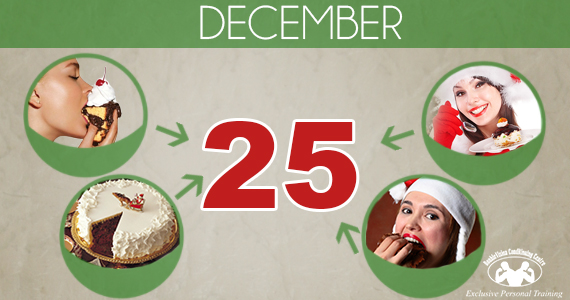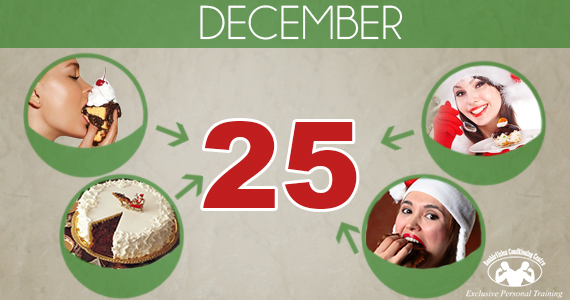
Christmas time is a time for fun frivolity and FOOD!
It’s a time where we let loose and enjoy eating to excess.
With this comes many lessons!
Some interesting, some painful and some that will help you lose fat in 2014! Listen up and take note…
Transcript:
Mark: Hello, and welcome to TheDVCC.com podcast. I’m Mark Gray and with me is Stephen.
Stephen: Hello there.
Mark: So today, we wanted to talk to you or with you about…
Stephen: Well, Christmas really, wasn’t it?
Mark: Yeah. So Christmas has just been. It’s the New Year resolutions time. And Christmas is always an interesting time because it’s – a lot of people will take it in two ways, a lot of people take it to have a massive break from December through and oftentimes actually seeps through into the middle of January in terms of exercising and good nutrition. But we’ve kind of wanted to recount our experiences I guess from this Christmas…
Stephen: How was your Christmas anyway, Mark?
Mark: It was nice. It was nice.
Stephen: Contrary to everyone’s belief, we don’t see each other every minute of every day.
Mark: No. So I spent it in Leicester up until Christmas day with my girlfriend’s families up there. And then I came down back to Bedfordshire or Bedfordshire and Milton Keynes really, isn’t it, to see my sister, her family and my parents for Christmas day as you were there the same you were away though for a bit of it.
Stephen: Yeah, I went to Yorkshire.
Mark: Yup, to Yorkshire.
Stephen: To see my girlfriend’s family which was lovely. Very nice up there, quite hilly, so lots of walks, lots of exercise and walking around.
Mark: Getting that in there because your girlfriend listens, good for you.
Stephen: Yeah, true.
Mark: So anyway, getting back to this subject at hand.
Stephen: So we wanted to talk about sort of the lessons I think. Sometimes Christmas can be a good reminder because it tends to be a time that you don’t eat the same sort of way as you would do the rest of the year. So it was quite a good insight into what would happen I think if, for me personally, if I change my eating habits. And so the first thing I noticed was I think I didn’t go too crazy over the whole, we would call it, Christmas and New Year period, but I did eat – I did slacken off my nutrition because I don’t think it’s time to try and eat perfectly over Christmas. So I did slacken off my nutrition. But what I found was that once I’d started eating bad food at Christmas eve actually, then from then it was a lot easier to eat more bad food, if that make sense. It was a lot harder to eat healthy once I’ve started eating and I was craving. I found out I was craving a lot, lot more in the way of sugar and actually, that’s true, that’s what happens to your body, you do start to crave sugar a lot more once you actually have more sugar. And so I found that I was definitely more inclined to eat sugary foods because I’d already started eating sugary foods. Did you find that the same?
Mark: I mean, yeah. Like you said, it’s the same, it’s Christmas time. We’ve said this to our clients. We’ve said this a lot that it’s not a time to – like everyone is human, I enjoy eating bad foods sometimes. Christmas is the time to eat enough that I’d never want to eat again or at least for the next few months until Easter. And so, yeah, I slackened off and you know what, it was easy, once I’ve started, to eat bad foods to continue. I mean, screw eating bad food, I’m going to carry on. But it did get to a point – so it was end of Christmas where I was kind of desperate for the New Year to start back being healthy, not having Christmas as a reason to eat badly. Realistically, it got to a point where I didn’t actually enjoy it because I wasn’t feeling very good.
Stephen: Well, I think it highlights to me that our recommendations that we – if you get people that say, “Oh, I can just eat a little bit of bad food everyday and I’m fine,” but actually, a lot of research shows as well, but also from my experience personally but also with lots of different clients, I think you’d agree, Mark, is that people that try and do that, they’re eating a lot more bad food than they actually realized. It’s not ever just one little sweet, it’s quite a few sweets throughout the day. And so the way we recommend is you’re going to eat well and healthily and then you’ll allow yourself a cheat meal or, I don’t like to call it cheat meal, but basically some time off maybe one meal every five days but you’ll have it in the evening and that way, you’ll then far – it’s far easy to eat healthily I find and clients find when they’re not just trying to have a little bit here and a little bit there.
Mark: Yeah, and I think by having a little bit here and there is actually it gradually builds up so you’re having more than the little.
Stephen: Yeah, often you realize. And people don’t do very well, I certainly don’t do very well with a little bit of something.
Mark: I think it’s human nature. There’s kind of different theories on there with the whole Paleo theory of when you use to come across, honey for example, that you didn’t kind of have a little bit every day, you splurge on it because you don’t know it’s going to come around that often.
Stephen: That’s what happens. So once you have that little bit of sugar, you’ll then going to crave more sugar. So what he meant to say and want a little bit — the difference in terms of caveman days is that you might splurge – you’re not going to come across it, so it just become a habit whereas in western worlds now, you have loads of sweets. It’s not like you can’t go and get a whole load more, so it’s kind of a never ending…
Mark: Well, a lot of these foods as well that we talk about that you would end up eating as you little bit of, what would you call it, little bit of naughty food, they’re designed to make you want more of them. They actually do some chemical special things to your brain that actually make you want to have more of them, sugary foods and more of those sorts of foods.
Stephen: Actually, I was conversation, I think it was Nathan from DVCC Bedford yesterday, and he said he’s pretty sure he’s read some research that shows that Oreos are as addictive as cocaine.
Mark: Really?
Stephen: Yes.
Mark: Wow. And we were discussing that, they’re quite tasty but not to the point of being addictive.
Stephen: I’m not sure. Cocaine is tasty.
Mark: No, I don’t know.
Stephen: But yeah, no. That’s one thing I massively noticed was that that definite craving for more sugary foods when I started eating sugary foods. And that kind of led on I think my second kind of point I really realized was for a couple of days, Christmas Day and Boxing Day, I didn’t eat – actually, no, that’s not true. I did on – now, which day? Sorry, no, for Christmas Day and Boxing Day, I didn’t have the normal breakfast I’d normally have which is high protein and healthy fat breakfast because – and I noticed an enormous difference, a massive difference. Basically, I think everyone realized it’s quite the same for you, well, we’re both at the same place, Mark, but Christmas Day is kind of revolves around the meal and we have also about two-ish I think.
Mark: It was two. Well, it’s maybe one, it’s maybe two.
Stephen: Maybe one, mom always just – it was Mish…
Mark: She’s obviously…
Stephen: …this time.
Mark: She’s taken after our mother and…
Stephen: And actually a little bit late. Don’t tell her that though, always a little bit late. So then you have a few snacks, don’t you, a few of like crisps or what have you. But then you’ve revolve around that meal, so you’re having a big meal. And I noticed that basically I didn’t really eat much for breakfast or anything properly anyway for breakfast and so the meal wasn’t, too, and I got so bloated by having that one meal. I could not believe how bad I felt and also how I wasn’t hungry after it. Normally, I’m very hungry consistently.
Mark: Obviously, I did something to myself because I didn’t most eat that much food after that lunch.
Stephen: No, that was…
Mark: Had all this be games of destroying loads of Doritos and chocolate after my lunch but I fell asleep. Stephen: But then that follows what we know and this is why one of the recommendations we talked about fat loss is that you eat regularly, you eat small amounts quite regularly because that keeps your metabolism up which funnily enough actually makes you want to eat more regularly anyway. And conversely, what you find is that by having big meals, less regularly, you end up eating more in the way of calories. So when people are talking about, oh, if I’m eating more regularly, eating more meals, I’m going to be eating far more in the way of food or in the way of calories. And that just isn’t true because your metabolism – well, number one, your metabolism is going quicker and that was one thing I noticed massively, my metabolism was quick to drop. That was another thing.
Actually, over Christmas, you tend to eat less regularly, well, I do anyway and I noticed I was less hungry but I would eat more after meal, if that makes sense and that kind of goes along with when you’re looking at fat loss recommendations for the New Year, eating small amounts regularly is a very good way of doing it.
Mark: And that goes along with our experience in you often get ladies, 45 have been on lots of diets, things. And when you’re asking them to eat, say, healthy breakfast and oftentimes, they’re not hungry and they say that they’re not hungry and that by lunch time, they’re not hungry and that’s because their metabolism is slow because of what they’ve done in the past and as you’re explaining there.
Stephen: Yeah, and that actually is exactly one of the reasons. Another one of the reasons is not having much in the way of muscle tone, not doing any real muscle toning type of exercises such as using resistance work. And that will lead on to my another point I kind of noticed when over kind of Christmas period which was not – I didn’t work out on a few days I normally would have done. So I had maybe days in a row of not working out, I think it was maybe three. I mean, I’m not using myself – I use myself an example, but when I spent that much time not working out, it was less likely that I won’t work out. And I also noticed that I wasn’t as hungry as regularly, so that was an example of my metabolism slowing down quite quickly.
And that surprised me how quick it was to slow down and obviously I’ve been exercising and eating pretty healthily for 10, 13 years now but it was still very quick to slow down, so that’s why but I think – and actually, it’s not as quick as you think to speed back up. I mean, I’m there now obviously because this is January time. But that’s one thing to note in the New Year, don’t expect just to start eating regularly and then in two days time, you’re going to feel like your metabolism is on fire again. So that was one thing I noticed. Do you?
Mark: I also like the fact that – or not like the fact, but this is interesting fact, that people, say, you splurge for a week and you eat really bad food and then you eat healthily the following week, it’s not that week that you’re going to notice any fat increase or any detrimental effect from the previous week, it’s the following week. So a client I was speaking to as I was training one of the sessions, David Saxton, he’d been away, too, and he was saying how he feels worse now and he’s been back, I think this isn’t his second week of being back in the second week. In the first week, he mostly himself have – on his belt, put on any weight but now in the second week, that’s where he had the effect and that often happens. So, just be aware that with the date now, you’re probably be feeling like you’ve actually put on a bit of fat the next week and that’s from your previous weeks efforts, so it’s nothing to do with the exercise. That’s only going to help you exercising good nutrition, so don’t…
Stephen: Don’t let that dishearten you.
Mark: Yeah, don’t let it dishearten you. It will come off pretty quickly but just be aware of that and it was just an interesting fact that he noticed and that’s something we’ve been saying for quite a few years because we’ve noticed it pretty much in ourselves but also with clients.
Stephen: Well actually, one thing I just thought or we’ve just both been talking about basically is breaking of our habits and it’s funny because that goes on to when people ask about losing weight in the New Year, how you do it. Basically, what we allowed ourselves to break which were some of the habits we have and which is why we didn’t feel that was good or healthy and et cetera, et cetera. That’s what you want to be trying to put in to your life so that this time next year, you can say, yeah, I know I felt worse during Christmas because I broke those habits that I’ve kept up for the whole year such as eating a good healthy protein and fat-rich breakfast, healthy fat breakfast in the morning, eating regularly, consistently over the day, another habit. I could say also my water intake was down over Christmas which actually made me feel – and one of the things with the sugar as well, I don’t know about anyone else, but I wake up as if I had about 50 pints of beer in the morning. I wake up with a very dry, very…
Mark: How would you know what 50 pints of beer is?
Stephen: It’s true.
Mark: I think the most beer you ever drank was when you’re 15 and taken out by the older boys at school.
Stephen: I was taken out. We went to a pub and I’ve never drank beer since because I was ill.
Mark: Everywhere.
Stephen: Everywhere in the garden of that pub. I would not mention the name of the pub but that’s why I don’t really drink much alcohol but certainly never beer, so that was one of the reasons. But, yeah, I always woke up – I was dehydrated because I’m having more sugar in the way of carbohydrate, it does absorb more water. So that was another habit that I lost that will be very beneficial for you when you’re looking to lose fat.
Mark: Just important with those habits, I mean, when you say broken, they’re not broken in terms of…
Stephen: Suspended.
Mark: Yeah, exactly, and that’s because you’ve been doing them for such a long time. So they’re easy to get back into
Stephen: Yeah.
Mark: Not easy but easier to get back into. So obviously the longer you do a habit, the easier it is to take this or hide from it and then get back on the whole whereas often, you’ll find these people that do diets or people that do diets, they’re obviously short-term so they don’t get back into habits or healthy eating. They change their diet for two weeks and then…
Stephen: Or here’s the thing, one thing that we people always ask, how should we eat over Christmas and what do we eat, what our recommendations or how…
Mark: Eat whatever you want.
Stephen: Over in a year though, how long you allow yourself to effectively be a lot more slack with your nutrition.
Mark: Well, you can take the times of the year as a reference. I’m not talking like every ridiculous holiday that there is nowadays but I’m talking Christmas, Easter. You’re going to have a summer holiday but you’re not going to be on a six-month summer holiday unless you – and if you are…
Stephen: And so the…
Mark: That’s for the holiday.
Stephen: Of if you’re away for six weeks on a summer holiday, then you’re not going to feel good if you…
Mark: No.
Stephen: You could take that time off nutritionally.
Mark: A couple of weeks. And then Christmastime, pretty much four times a year.
Stephen: So basically, that equals out to about four weeks of allowing yourself – within 52 weeks, basically allowing yourself off or nutritionally be more slacked.
Mark: Or it’s not even allowing yourself off because if you’ve formed the habits, that’s just how you eat, it’s normal healthy foods you eat. Actually, making conscious effort to eat stuff that perhaps you deemed, you kind of get a misconstrued conception that this can really be tasting really nice and it might be to start with. But obviously, if you did it all the time, it becomes the norm and it wouldn’t be as tasty. You probably actually crave to have nice good foods.
Stephen: Well, that leads in to another point now, isn’t it? I think a lot of people end up with a lot of guilt after Christmas. Do you have any guilt from your Christmas?
Mark: None whatsoever. None whatsoever because I love myself to eat that way, but also I know that’s not normal. I’m building the habits of going back in and I’m back into normal everyday life which is what makes me feel better. Constantly, I felt that good every Christmas, to be honest.
Stephen: And that’s the key I think is if you feel really good to eating bad food and putting on weight, then that’s totally fine. That’s what you should do, disregarding health issues but that’s what you should do, that’s your choice. But if you don’t feel good and you’re putting on weight and you want to lose weight, then you want to form habits that make you feel good and that’s the key, isn’t it?
Mark: And probably you talk about – you quickly mention about habits because we mentioned last in the bloody way but basically it takes 21 days at least to build a habit, of doing it consistently. So if we’re talking about having the right type of high protein, high healthy fat breakfast, you would do that every day for 21 days and then that becomes, what we call a habit, something that doesn’t take any mental energy such as when you go and clean your teeth, you don’t actually have to use much mental energy. So if you would imagine it that you only have a certain amount of mental energy in a day, then you want to have things that don’t take much of that mental energy because if you’re having to constantly think and try and have the right sort of breakfast or the right sort of lunch, that you’re constantly having to use that mental energy and you only have a certain amount tops. So by the end of the day, you’re going to run out and that’s when you’re going to go and being joy and what have you. So by forming these habits, you’re going to reduce the amount of mental energy, basically losing fat takes and which will mean you’re going far more likely to be successful.
Stephen: See, I like to think of it also as – imagine you have a pint glass and it starts the day empty and then as stresses and strains happen in a day starts filling up, as you’re having to use your willpower to stay away from that chocolate at lunchtime or whatever fills up more. And obviously, with a pint glass, if you start filling it up to the top, there’s only a maximum level it can hit.
Mark: Well, yeah, just for example, you’re talking about stopping yourself from having that chocolate bar, that was actually as a result of not having a habit that keeps you full and not craving sugar, so then that would use your willpower.
Stephen: Yeah, exactly. So then you’re going to the day, your pint glass is filling up because you haven’t used your willpower, but then you’ve obviously got everyday life, your family, your kids playing up, whatever issues you have. And once it gets to the top, what happens when you pour water on top of the pint glass, it runs over, right? This is the same thing with – and then that’s how you can feel drain, you’ve had a really – you might be sitting at your desk or whatever for the day but you’ve been focusing and having to use a lot of your brain power, a lot of willpower, so you’ll feel drain at the end of the day and you’re much less likely to be able to go and exercise as well.
Mark: And you’re far more likely to go and…
Stephen: Eat bad foods.
Mark: Eat sugary foods because that unleashes your serotonin which makes you happy for a very short period of time.
Stephen: Yeah.
Mark: So the habits are really the key way to go. And so literally, this is the perfect time to talk about it, but if you are to introduce one new habit every 21 days, I think that’s 16.66 habits, so basically 16 habits you can introduce in a year that are going to help you towards your goals. And that’s true with anything. So when we talk about fat loss even if you just introduce five, I’m positive you would lose enough fat and that’s actually why we’ve developed one of the – part of the forms are main weight loss protocol is the Weight Loss Habit Builder TM which is trademark and that’s basically the most important habits that you need to have to lose weight. And that’s true of anyone because everyone needs this. Actually, there is some really key habits that are very important to have if you want to lose weight and that’s from hundreds of transformations that our clients have made that we’ve seen and we will actually introduce these same habits.
Stephen: And that’s how we get our clients’ great transformations is by using this trademark protocols that we developed and the Weight Loss Habit Builder is the foundation for weight loss which is basically 80% of everything we do for our clients is weight loss related and that’s why we get such success because the Weight Loss Habit Builder is a protocol. It’s proven. It’s a process that’s been proven time and time again. When people go through the same process, they end up with the same result which is weight loss exactly, fat loss.
Mark: Fat loss, yes, exactly. So anyway that was a little update Christmastime. We will be producing more podcast, of course, weekly. So if you have any questions, you can leave them in the box below this. Go to TheDVCC.com and you can leave a comment at the bottom of the blog. Everything is written up, so you can listen to an audio or you can watch the written up version. And then obviously, we have lots of videos that we shoot. So if you have any questions, please leave one there or, of course, on any of the other social medias, Facebook, Twitter, Instagram, Pinterest. We’re in all of the above, so comment on there, we’ll talk about you.
Stephen: For Pinterest, what’s our URL?
Mark: It’s Pinterest.com/thedvcc.
Stephen: SnapChat?
Mark: SnapChat is in development. It’s tough to get there. It’s slightly different, so you have a number so you don’t have to use names, so it will be a bit hard to give out over here. But if you go to our Facebook page, like that, and then I’ll be putting our SnapChat username on that.
Stephen: So like us up. We’ll be able to send each other interesting SnapChats or food perhaps.
Mark: Anyway, as always, nice to speak to you. This is Mark and Steve from TheDVCC.com
Stephen: Bye-bye.







